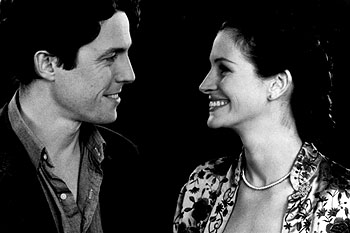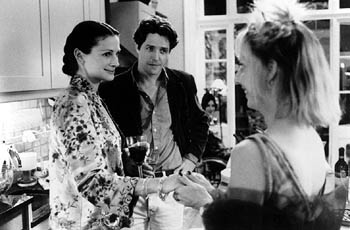![[safe]](safe.gif)

Notting Hill

Starring Julia Roberts, Hugh Grant, Rhys Ifans
Directed by Roger Michell
![[safe]](safe.gif)


What if the most glamorously famous person in the world came into your life and decided to start a relationship with you?

This is the unique position William Thacker (Hugh Grant) finds himself in. One day, along a busy stretch of shopping in London's newly fashionable Notting Hill district, Anna Scott - the most famous actress in Hollywood (and therefore the world, as the decidedly feeble-minded script by Richard Curtis intimates) - waltzes into William's ailing travel bookstore, just on a lark. Unaccompanied by her minions, even though she is thousands of miles away and on a location shoot, Anna takes a liking to William, so much so that as she leaves the store, she decides to plant a big fat kiss on his lips. This takes our stuttering hero by surprise, naturally (Grant has the stuttering requirement written into his contract, I'm sure). What is more surprising is that Anna decides - for no apparent reason at all - to embark on a casual relationship with him, accompanying him to his sister's birthday party, delighting his group of stridently off-beat friends, all of whom are actually a lot more interesting than Anna and William combined. Just as things start to turn serious, however, Anna's no good boyfriend from America flies in to break up their tranquil existence, and she leaves, presumably never to be heard from again. That is, until the script again mandates that she turn up at William's store, this time dodging a nude photo scandal - but really, that's just another pretext for her to meet up with him and carry on their interrupted affair. As we've come to expect from Curtis' scripts, this dewy glow of happiness they share cannot last, and they must be thwarted once again (this time by the all powerful and evil press) before a last minute, giddily amusing sequence when true love conquers all. At a press conference.
Did I mention this is one of the most annoying films I've seen this year?
Working from a premise that is fascinating and potentially exciting, the scribe of the highly over-rated "Four Weddings and a Funeral" has fashioned a patently fake, unbelievable romantic dramedy that treats its characters as ciphers, and which conjures up one improbable situation after another in the name of entertainment. Scripts like these insult audiences everywhere, with its simple-minded resolutions and pat endings - but there's no denying that a certain portion of the movie-going audience will fall in love with this film.

How could they not, since it stars the radiant Julia Roberts? Playing a role not too far removed from her own existence, Roberts gives an understated, nuanced performance. She's given one very interesting sequence to play - when Anna is forced to dodge the press and vents her cruelty and anger on William - and she, alone, succeeds in fleshing out a three-dimensional character among the gallery of cartoons that Curtis' script has provided. Grant, still not the best actor alive, floppy-hair and all, is simply perfunctory in his role as the reactive other in the piece. When he's not moping about alone, he's moping about with his group of terminally oddball friends. These supporting characters, played brilliantly by Hugh Bonneville, Emma Chambers, James Dreyfus, Tim McInnerny, Richard McCabe and especially Gina McKee, are given the only marginally sensible bits in the film to play, although they, too, are eventually reduced to joining William on a madcap car chase to pursue his true love. The strangest character in the film, played by Rhys Ifans, is someone who doesn't actually exist in real life - he's Curtis' most conceited construct, and although Ifans is a game and charismatic performer, Spike just seems like an idiotic plot device.

Director Roger Michell tries his best to bring some modicum of sensibility to the entire film. However, he uses a grab bag assortment of techniques (show off crane shots, directing off-beat speech rhythms) to keep the audience focussed on the highly unlikely central romance between Anna and William. The script tacks on a ludicrous and sickeningly sweet ending which will send many rushing out to recommend the film to their friends.
The best Julia Roberts movies tend to be fairy-tales, and "Notting Hill" certainly is a
fairy-tale. Unfortunately, the numerous implausibilities of Curtis' script makes this seem like
one of those nauseating "Politically Correct" books that were so big some time ago - calculated
to within an inch of its life to be a commercial success. Succeed it will, though, simply
because there is no other star like Julia, and in this film, she carries the weight of being
the most famous actress in the world very well.